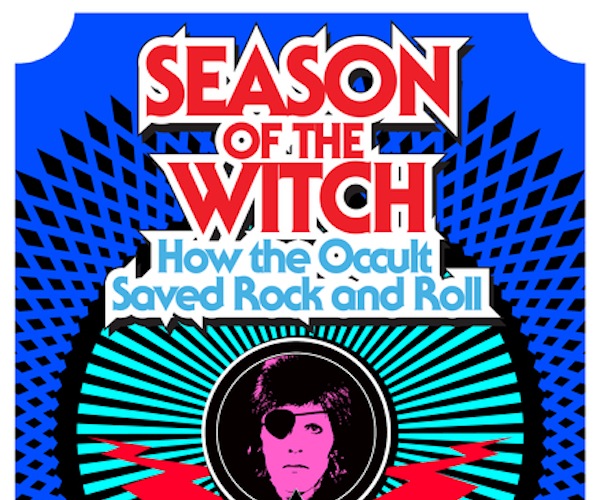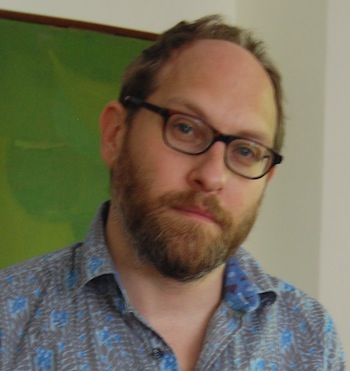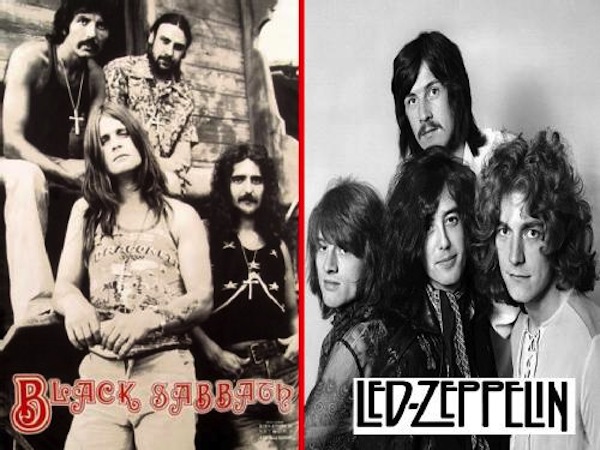Book Interview: “Season of the Witch” — Rock ‘n’ Roll and the Occult Imagination
“To say that the occult ‘saved’ it is really to say that the spiritual agitation is at the heart of what was able to bring rock ‘n’ roll to its most interesting places.”
Season of the Witch: How the Occult Saved Rock and Roll by Peter Bebergal. Penguin Random House, 288 pages, $27.95.

By Blake Maddux
Peter Bebergal is the co-author (with Scott Korb) of The Faith Between Us: A Jew and and a Catholic Search for the Meaning of God and the lone author of Too Much to Dream: A Psychedelic American Boyhood and, most recently, Season of the Witch: How the Occult Saved Rock and Roll.
A self-described “failed mystic,” “dungeon master,” and “circuit bender,” he also blogs at mysterytheater.blogspot.com.
While Bebergal acknowledges that the subtitle “is a bit of hyperbole,” he writes in Season of the Witch that “weaving in and out of the most important moments of rock’s development is the occult, the central thread that, if pulled out, would unravel the whole intricate design.”
Season of the Witch traces the use of occult imagery in popular music from the early days of blues and gospel up through Jay-Z, giving in-depth consideration to major rock acts such as Pink Floyd and David Bowie and stopping to smell the roses of far less celebrated artists like Arthur Brown, Black Widow, and Coven.
Bebergal was born in Swampscott and currently resides with his family in Cambridge. He recently spoke to The Arts Fuse by phone about his latest book, his personal religious perspectives, and his somewhat unlikely choice for a desert-island album.
Arts Fuse: You studied religion at Brandeis University as an undergraduate and have a Master of Theological Studies from Harvard Divinity School. Are you a religious person?

Author Peter Bebergal — “My approach has always been to investigate how the religious imagination expresses itself in literature and in art and music.
Peter Bebergal: I am sympathetic to what I call the “religious imagination,” and I am definitely not an atheist by any stretch of the imagination. I am Jewish, so that is part of my background and in terms of my actual formal practice, we have Passover and Rosh Hashanah and things like that. But spiritually, like I said, I typically call myself a “believing skeptic.”
Part of the reason why I wanted to write Season of the Witch was it’s an extension of an important part of my thinking on this. I find it much more interesting to find the spiritual imagination expressed in things like art and music and literature than I do in what people have to say about what they believe. And that extends even into things like the occult or any kind of spiritual idea.
My approach has always been to investigate how the religious imagination expresses itself in literature and in art and music.
AF: What do you consider to be contained within the parameters of the occult?
Bebergal: When I talk about the occult, I’m really talking about, again, I use this phrase “the occult imagination” to really talk about an entire phenomena of not just what we typically think of as practices – like tarot cards, or magic, or spiritualism – but rather the ways in which people have engaged with those things. Sometimes it’s to be opposed to them. Sometimes it’s to use them merely for inspiration. Sometimes it’s to actually believe in them. So I’m really talking about a whole spectrum of beliefs or ideas that are pushing up against the mainstream. So just as rock ‘n’ roll had once been so social and political and even sexual rebellion, I also argue that it’s spiritual rebellion, and that spiritual rebellion more often than not expresses itself through these sort of occult ideas and symbols.
AF: Is the occult a lifelong or more recently developed interest?
Bebergal: I’ve always been interested in alternative spiritual things. I’ve always been interested in things that are a little bit on the fringe. I was a kid who grew up playing D&D [Dungeons & Dragons] and reading monster magazines and comic books and was interested in the occult at a kid. My consciousness has sort of been formed by weirdness, I guess you could say. Even as a writer and as someone who has tried to have a little bit of critical distance from these things, I’m still absolutely in love with the culture and the ideas. So it only made sense for me that I’d eventually want to look at, in depth, something that was really about my favorite things, which are rock ‘n’ roll and weird ideas and the culture that surrounds those things.
AF: Did the occult actually “save” rock ‘n’ roll, or did it just give it the new personality that it needed once the old one had worn out?
Bebergal: I guess to say that the occult “saved” it is really to say that the spiritual agitation is at the heart of what was able to bring rock ‘n’ roll to its most interesting places. We see it in the Beatles, and that shift for them – musically and sonically – was in many ways happening at the same time that their interest in Eastern spirituality, mysticism, and LSD was coming together. If we look at how rock ‘n’ roll sort of changed its face in the 70s with Led Zeppelin and Black Sabbath, we again see that the way in which these bands sort of created a mystique around themselves, whether deliberately or unconsciously, was again through these sort of occult ideas. Again, whether or not any of these bands practiced is sort of irrelevant to the way in which these symbols and these ideas became important to the way the culture at large understood them. And then we look at the next level of bringing rock ‘n’ roll to a really performative spectacle, we see that with somebody like David Bowie or Arthur Brown, two performers who were very much interested in the way that ideas about magic and the occult could actually be tools for changing consciousness.
And so to say that it saved it is to say that every step along the way where we have these really radical transitions, the occult imagination is ever-present. If you were to have removed that, rock ‘n’ roll would sound very different. That’s not in any way to say that there wasn’t also just the sugary pop always around. Not everybody was game, not everybody wanted to experiment, not everybody wanted to take LSD, not everybody wanted to put an upside-down pentagram on their album cover.
AF: So were there many artists who did not draw upon the occult but still contributed to rock ‘n’ roll’s surviving and thriving?
Bebergal: Definitely, but I think that the bands that were not interested in those ideas may have still been interested in LSD, and by extension alternative religion, like Buddhism and Eastern mysticism. People have faulted me because I include those type of things when talking about the occult in general. I guess what I am really doing is using the word occult as a stand-in for any alternative spiritual practice, some that don’t have anything to do with the devil at all. In fact the devil rarely shows up in my book. I think the bigger part of the story is that when musicians – or any artists, really – found themselves pushing up against mainstream they often turned to alternative religious ideas to inspire them, to feel like what they were doing had a spiritual foundation. To play rock ‘n’ roll meant that you were going against mainstream Christian values, what you were doing had this sort of sexual bulwark and was anti-authority. If people are telling you that what you’re doing in anti-Christian and then you are seeking some sort of spiritual identity, you are going to turn to something that is considered by the mainstream church to be bad or dangerous. That could be anything from yoga to the devil.
I think that the root of rock ‘n’ roll’s essential spirit is spiritual rebellion. That spiritual rebellion expressed itself using the alternative spiritual ideas. Sometimes it was just sort of fueled by the sort of weird spiritual idea to come out of LSD other psychedelic drugs, which had a huge impact on their own. Certainly I would never argue that without the occult there would be no rock ‘n’ roll, nor am I trying to undo or undermine the accepted narrative of rock history. But I do argue in the book that there is this other thread that we should look at, which had incredible influence during major points along the way where things really did change, like the Beatles, Led Zeppelin, and even synthesizers. Along these really essential points along the way there was really radical innovation, the occult imagination is deeply present.

AF: Can one fully appreciate Syd Barrett’s songs on Pink Floyd’s album The Piper at the Gates of Dawn without being aware of their literary influences?
Bebergal: In the end it’s just about the music. The music is absolutely phenomenal. But, for example, the song “Chapter 24” is too mysterious and strange to not want to investigate further what it means. And then to find out, like I did when I was a teenager, that it came from the book of Chinese oracles called the I Ching, which was very popular in the 1960s along with tarot cards. So I don’t think that you need to know those things at all to be able to be really transported by that music. But at the same time, our proverbial third eye gets turned on and we become curious in a way that a lot of people, particularly teenagers, did in the 60s and 70s. I think many people found rock ‘n’ roll a doorway to investigate alternative spiritual ideas.
AF: You quote a Washington Post reporter as writing, in 1969, “Mick Jagger is the closest thing to an incarnation of evil that rock has.” Was he actually worthy of such an estimation?
Bebergal: Jagger didn’t have anything to do with Satan at all in terms of an anti-Christ. It was more a very literary idea of Satan as Lucifer as sort of this fallen angel. And that’s what I think Jagger was really excited about. It’s not that he was trying to bring about the apocalypse. He was trying to seduce your daughters. So there’s a little bit more of a literary, poetic idea of a charming Mephistophelean dandy. The claim that Jagger was evil is maybe a little more than a stretch. He certainly was able, which I think Jagger loved, to create this sinister character. And again, I think it’s all about the showmanship. I don’t think Jagger ever in his life tried to perform any kind of magical or satanic rituals. It’s about the performance and about the performance. I think that goes to the heart of stage magic. We want to be tricked, to be completely awed. We know that Jagger is not the devil, but it’s certainly exciting when seeing him on stage and listening to his music to feel like there really is some dark force at work and to allow ourselves to be seduced by that. There’s a thrill that comes along with that, even though we know it’s not really happening to feel like it is.

Sabbath & Zep — together again.
AF: I am not sure that the rhyming of “their masses” with “black masses” in Black Sabbath’s “War Pigs” is, as you call it, “the worst couplet in the history of rock,” but it is definitely cringe-worthy. However, don’t they more than compensate for it in the same song with “Begging mercy for their sins/Satan laughing spreads his wings”?
Bebergal: That’s a good rhyme for sure!
AF: I have always tried to explain to people, as you also do in the book, that the devil is never the good guy in any Black Sabbath songs. Why did religious people or other concerned adults not pick up on this?
Bebergal: For many people, they shouldn’t have been singing about the devil at all. And the fact that their songs themselves sound so ominous, for people who really read the lyrics, it can sound like the band is actually being honored. But even their fans enjoyed that sense of it. Their songs might not evoke the devil, but they don’t on the other side say that Jesus is the savior. So there’s not a lot of hope there. That creates something kind of sinister.
AF: Were there any artists whom one would not typically associate with the occult who were nonetheless inspired by it?
Bebergal: I was often surprised to find out where along the way people who I would never have expected to become interested in these things were interested in them. One example that I talk about in the book is Daryl Hall of Hall & Oates, who becomes very interested in the work of Alistair Crowley and worked with [King Crimson’s] Robert Fripp, who produces an album for him called Sacred Songs (1980), which was driven by his interest in magic and the occult. Here’s like the most pretty boy pop star of the 70s doing an album that was pretty experimental for him. His record company did not want him to do it and they didn’t really support it at all. But if you listen to it now, it’s a beautiful, remarkable album, and you get to see that Daryl Hall really had chops beyond just the Top 40 soft-rock sounds of Hall & Oates. But again, it took the occult imagination to bring that out in him, which I find, you know, really fascinating.
AF: Do you have any favorite albums that might surprise people who know you as the author of one book about psychedelic music and another about the influence of the occult on rock ‘n’ roll?
Bebergal: My desert-island album, if I could listen to only one album for the rest of my life, would be Joni Mitchell’s Blue.
Blake Maddux is a freelance journalist and regular contributor to DigBoston and The Somerville Times. He recently received a master’s degree from Harvard Extension School, which awarded him the Dean’s Thesis Prize in Journalism. A native Ohioan, he moved to Boston in 2002 and currently lives with his wife in Salem, Massachusetts.
Tagged: devil worship, occult, Peter Bebergal, Rock-and-Roll
